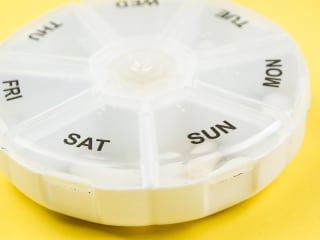Overview

Most people with heart failure take several medicines to help their heart work better. Medicines may be used to relieve symptoms, help you feel better, and lower your risk for serious problems that would need to be treated in the hospital.
It's important to take all your medicines exactly as prescribed to get the best results. They can cause side effects. If you think that any of your medicines are causing side effects, talk with your doctor or pharmacist. They may be able to help by changing the medicine or the dose.
Follow-up care is a key part of your treatment and safety. Be sure to make and go to all appointments, and call your doctor if you are having problems. It's also a good idea to know your test results and keep a list of the medicines you take.
What medicines are used for heart failure?
This list includes many of the common medicines used to treat heart failure. You will get more details on the specific medicines your doctor prescribes.
- Aldosterone receptor antagonists. These make the kidneys get rid of extra fluid and lower blood pressure. They also help keep the heart muscle healthy.
- Angiotensin-converting enzyme (ACE) inhibitors. These relax and widen blood vessels. This makes it easier for blood to flow through the vessels.
- Angiotensin II receptor blockers (ARBs). These relax and widen blood vessels. This makes it easier for blood to flow through the vessels.
- Angiotensin receptor neprilysin inhibitors (ARNIs). These also make it easier for blood to flow through the vessels.
- Beta-blockers. These slow the heart rate. They also lower the workload on the heart.
- Diuretics. These reduce swelling. They do this by helping the kidneys get rid of extra fluid. They also help prevent fluid buildup in the lungs.
- Hydralazine. This may be taken with a nitrate to widen blood vessels. It can lower blood pressure and reduce the workload on the heart.
- Ivabradine. This slows the heart rate.
- Sodium-glucose transporter 2 (SGLT2) inhibitors. These help the kidneys get rid of extra fluid and salt (sodium). They may widen the blood vessels and reduce the workload on the heart.
What can you do to make problems less likely?
- Be safe with medicines. Take your medicines exactly as prescribed. Call your doctor if you think you are having a problem with your medicine.
- Tell your doctor all the medicines you take. This includes other prescription medicines, over-the-counter medicines, vitamins, supplements, and herbal remedies. Take the list to each doctor or hospital visit. Ask your doctor if there are any things on your list that you don't need. Find out if there are things you shouldn't take. Anytime you see a doctor, bring your list of medicines.
- Give your pharmacist your list of medicines before you pick up any new ones. Ask about interactions with any other medicines you take. If you go to more than one drugstore, make sure each of them has your list.
- Ask your doctor or pharmacist to run your list through a drug interaction checker. This is a computer database. It checks for medicines that can cause problems with others. If you find a problem, talk to your doctor.
- Know your medicines by name. Understand what they do. Know how to take each one. Check the information that comes with your medicine, or ask your doctor or pharmacist about the side effects of each medicine you take.
- Ask your doctor what side effects to expect. Learn what to do if you have one. Keep track of any symptoms or changes in how you feel.
- Do not start taking any new over-the-counter medicines, vitamins, supplements, and herbal remedies without talking to your doctor first.
Where can you learn more?
Go to http://www.healthwise.net/patientEd
Enter F132 in the search box to learn more about "Medicines for Heart Failure: Care Instructions".
Current as of: October 2, 2025
Author: Ignite Healthwise, LLC Staff
Clinical Review Board
All Ignite Healthwise, LLC education is reviewed by a team that includes physicians, nurses, advanced practitioners, registered dieticians, and other healthcare professionals.

